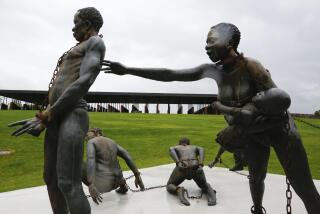Struggling With the Demons of the Past
- Share via
It ended, her long pursuit of truth if not justice, in a trading-company office in Johannesburg’s warehouse district. Across from her sat one of the former secret police agents who killed her mother.
Gillian Slovo is the daughter of Ruth First and Joe Slovo, white leaders in the long clandestine fight against South Africa’s apartheid regime. Slovo was chief of staff of the military underground. He came back from exile in triumph with Nelson Mandela to negotiate the extraordinary compromise that led to apartheid’s end.
His wife never made it. In 1982, a bomb in a buff envelope with a U.N. letterhead smeared parts of First’s body on the walls of the office in Mozambique where she worked on propaganda. Played by Barbara Hershey, she was the subject of the film “A World Apart,” written by Gillian’s older sister, Shawn Slovo. If Shawn was Clotho, the Fate who spins the thread of human life, Gillian is Atropos, the Fate who cuts it. Her “Every Secret Thing” is a daughter’s memoir not as apotheosis, but as excavation and interment.
Much of the book stresses the pain of growing up with parents whose main commitment was to public life. It was a public life of danger, concealment and sudden moves. “In most families it is the children who leave the parents,” Slovo writes. “In mine it was the parents.” She avows her admiration; she never conceals her bitterness.
In the 1950s, the Slovo’s political activism had its excitement as well as dangers. They had money, they were celebrities in an opposition that was still tolerated. By 1960, this had changed. Joe went abroad to organize military resistance. Ruth spent the next few years underground or in jail. The children lived with their grandmother and scarce news.
Reunited in London, the family faced a different kind of hardship; while Joe disappeared for months on secret missions, Ruth was angrily reduced to domesticity. As soon as they grew up, the three daughters left home and Ruth moved to Maputo and took up her resistance activities.
Slovo never quite gets her feelings together. She is a competent writer, but introspection is not her strength. She agonizes as she traces her parents’ extramarital affairs, only to come to a welcome halt when an old family friend asks why it could matter after all these years. Much better are her descriptions of Ruth’s death and Joe’s last days as an honored and influential figure back in his country.
It is in her meeting with her mother’s killer that Slovo’s memoir gains power and significance. What she finds is 300 pounds of phlegmatic moral displacement.
Craig Williamson was a student informer for the security forces and later a full-time functionary for “wet” operations. Now, in the new order, he is a businessman. He receives her after several weeks of evasion, then talks for hours.
“It was almost casual,” he explains smoothly. “It wasn’t as though somebody was responsible for this kind of thing . . . it was almost luck of the draw.” Finally comes the philosophic conclusion: “God help us . . . we must just try and stop this thing so we can move upwards and not downwards.”
Later Slovo wonders why she felt neither fury nor a lust for revenge. “Our meeting had been an exercise in dissociation from which I’d emerged in a stupor that had sent me into a dreamless afternoon sleep.” She had found no answer but only the banality of evil.
And reasonably secure. The South African Truth and Reconciliation Commission was preparing its hearings. Slovo’s interview suggests, perhaps unintentionally, the second term in “lesser evil.” To bar the way against a national recrimination that South African society could not afford, those implicated in political crimes will gain immunity if they recount what they did. The danger, of course, is that confession will not purge but--as with Slovo’s upwardly mobile interlocutor--engorge. And that its effect on the nation’s spirit will be not lightening but lethargy.
More to Read
Sign up for our Book Club newsletter
Get the latest news, events and more from the Los Angeles Times Book Club, and help us get L.A. reading and talking.
You may occasionally receive promotional content from the Los Angeles Times.






